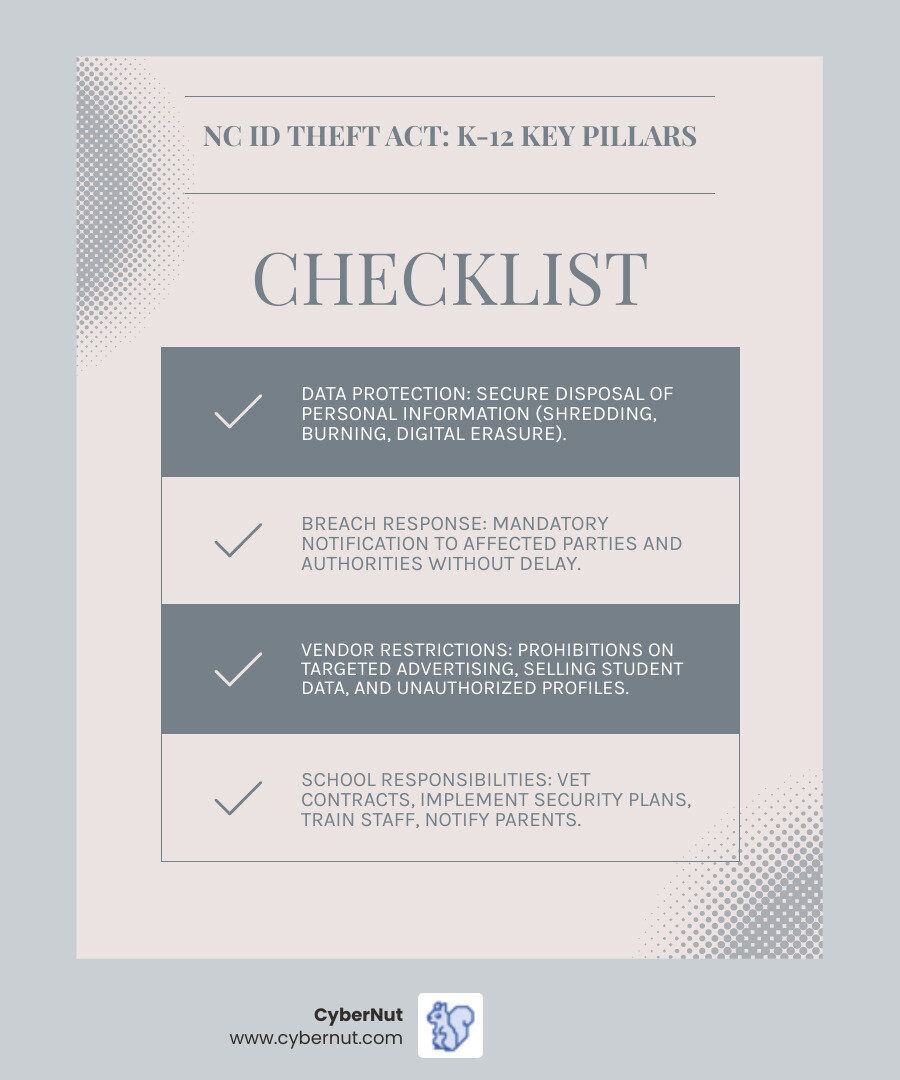
Oliver Page
Case study
November 13, 2025

What to Know About the NC Identity Theft Protection Act for K–12 is critical for every school administrator, IT director, and educator in North Carolina. This state law mandates safeguards for student information, requiring schools and their vendors to implement specific security measures, prohibit harmful data practices, and notify families when breaches occur.
Quick Answer: Key Things to Know
The 2024 PowerSchool contractor breach, which potentially exposed records of millions of NC students, underscored the urgency of these protections. Children's data is a prime target for cybercriminals because identity theft can go unnoticed for years, making compliance with the NC Identity Theft Protection Act a moral imperative.
The Act complements federal laws like FERPA by adding specific requirements for data disposal, breach notifications, and vendor conduct. For NC schools, understanding these rules is the foundation of student safety.

The North Carolina Identity Theft Protection Act, found in Chapter 75, Article 2A of the General Statutes, is a comprehensive framework that applies to businesses, government agencies, and K-12 schools. It's particularly important for schools, which handle vast amounts of sensitive student data daily.

The Act sets clear rules for how organizations must handle, protect, and dispose of personal information. It also mandates rapid notification when breaches occur. For a full overview, see the North Carolina's Identity Theft Protection Act overview.
Under the Act, "personal information" is a person's first name or initial and last name combined with other identifying details like a Social Security number (SSN), driver's license number, or financial account number with its access code.
The Act gives special status to children under 16, defining them as a "protected consumer." This is because child identity theft often goes undetected for years. In response, the NC Department of Public Instruction (NCDPI) replaced SSN-based systems with a Unique ID (UID) system for students and staff—a best practice for all schools.
Related statutes also prohibit collecting certain biometric data, political affiliations, and religious information in student data systems. For more on what constitutes sensitive data, see our article on Sensitive Data Definition and Types.
When disposing of records, schools must take "reasonable measures." For paper records, this means burning, pulverizing, or shredding. For electronic media, data must be destroyed or erased so it cannot be reconstructed. Simply deleting files or tossing papers in the recycling is a violation of the law.
A security breach is the unauthorized access to unencrypted personal information where illegal use is likely. If a breach occurs, you must notify affected individuals "without unreasonable delay." The only exception is a temporary delay requested by law enforcement for an investigation.
The notification must be clear and conspicuous, explaining the incident, the type of information compromised, the school's response, and advice for families, such as monitoring credit reports. The 2024 PowerSchool breach highlighted the importance of these rapid notifications. You can review specific requirements in the full text of the Act.
Two additional laws, House Bill 632 and Senate Bill 815, add K-12 specific protections.
HB632, the Student Online Privacy Protection Act, targets educational technology providers. It prohibits them from engaging in targeted advertising based on student data, building student profiles for non-educational purposes, or selling student data. It also requires them to implement reasonable security and delete student information within 45 days upon request from a school.
SB 815 mandated that the State Board of Education create a secure student data system with a comprehensive security plan. This law requires privacy policies compliant with FERPA, prohibits unauthorized data transfers, and mandates that vendor contracts include privacy and security safeguards with penalties for noncompliance. It also restricts the collection of biometric and lifestyle data.
Together, these laws create a comprehensive shield around student data, recognizing that children require special protections in the digital age.
Protecting student data is a shared responsibility among school districts, IT directors, ed-tech vendors, and state agencies. Compliance with What to Know About the NC Identity Theft Protection Act for K–12 is a team effort, and failures can have devastating consequences.

As a school administrator or local education agency (LEA) employee, you are on the front lines of data protection. Key responsibilities include:
Ed-tech vendors serving NC schools must adhere to strict legal obligations under HB632. Key requirements include honoring data deletion requests within 45 days and implementing and maintaining reasonable security procedures appropriate for the data's sensitivity.
Most importantly, the law places strict use limitations on student data. Prohibited activities for ed-tech vendors include:
Ignoring the NC Identity Theft Protection Act carries significant costs.
Compliance is about protecting children and maintaining the trust that makes education possible. To identify your school's vulnerabilities, consider requesting a free phishing audit to see how prepared your staff is.
The Family Educational Rights and Privacy Act (FERPA) has been the cornerstone of student privacy since 1974. However, What to Know About the NC Identity Theft Protection Act for K–12 involves understanding that North Carolina has built additional layers of protection that work alongside FERPA to create a stronger shield for student data.
![TABLE] comparing the key features of the NC Identity Theft Protection Act and FERPA, including scope, protected information, primary focus, and enforcement - What to Know About the NC Identity Theft Protection Act for K–12 infographic ](https://images.bannerbear.com/direct/4mGpW3zwpg0ZK0AxQw/requests/000/115/532/958/0eb715rd3zL8jK1azBPpEmKay/540577c577beb05495a0ae0db23980dc11064a16.jpg)
FeatureFERPA (Federal)NC Identity Theft Protection Act (State)Primary FocusProtects student privacy by controlling access to "education records."Prevents identity theft by protecting "personal information."Protected InfoPersonally Identifiable Information (PII) within education records (grades, transcripts).Broader PII, including SSNs, financial data, biometric info, and "covered information" from online services.Vendor RulesRequires vendors acting for schools to protect data using "reasonable methods."Explicitly prohibits vendors from targeted advertising, selling data, or building non-educational profiles (HB632).Breach NoticeGeneral guidance on protecting data; breach notification is not its primary focus.Mandates prompt, detailed notification to affected individuals and authorities.EnforcementPrimarily through the U.S. Dept. of Education; potential loss of federal funding (rarely used).NC Attorney General can take civil action; includes financial penalties, criminal charges, and loss of data access for vendors.
Think of FERPA as the foundation and North Carolina's laws as the reinforced walls. The NC Act has a broader scope, protecting any "personal information" that could lead to identity theft, even if it's not part of a formal "education record." It also imposes more specific business obligations on ed-tech vendors, explicitly banning practices like targeted advertising. The state law's identity theft focus leads to practical requirements for data disposal and special protections for minors. Finally, it mandates data security specifics, requiring schools to develop comprehensive security plans.
For more on the federal law, read All About FERPA: The Federal Student Privacy Law That Still Matters in 2025.
The laws work together, but their differences are key to full compliance. North Carolina's law protects a wider range of information types and has more detailed notification requirements in the event of a breach. The state's rules for application to vendors are far more explicit, making contracts easier to enforce. Finally, the enforcement mechanisms under state law are more varied and direct, including civil and criminal penalties. Understanding both sets of laws is essential for building a true culture of data protection.
Understanding What to Know About the NC Identity Theft Protection Act for K–12 is the first step; putting that knowledge into practice is the next. Protecting student data is an ongoing commitment that requires a clear plan and a culture of cybersecurity awareness.

As an administrator or IT director, you can turn compliance into meaningful action:
Parents are essential partners in protecting their child's data:
Even the best technical defenses can fail if a staff member clicks on a malicious link. Human error remains a leading cause of data breaches, making cybersecurity awareness essential.
Phishing attacks are increasingly sophisticated and are a primary vector for ransomware that targets schools. Building a security culture where everyone understands the basics, recognizes threats, and knows how to respond is critical. When your entire staff becomes a human firewall, you multiply your defenses. Our article on Phishing Awareness: Safeguarding K–12 Schools from Cyber Threats explains this threat in more detail.
This is why CyberNut's automated, gamified training is so effective for K-12 schools. It builds awareness that sticks. To see your school's vulnerabilities, request a free phishing audit and get a clear picture of your staff's readiness.
Understanding What to Know About the NC Identity Theft Protection Act for K–12 is not just about legal compliance—it's about safeguarding the futures of North Carolina's students. The PowerSchool breach was a stark reminder that children are prime targets for identity theft, and the consequences can last a lifetime.
The responsibility is shared. School administrators must implement robust security plans and train staff. Ed-tech providers must adhere to strict data use limitations. Parents must be active partners in overseeing their child's data. North Carolina's laws, working with FERPA, provide a strong framework, but it's our collective action that gives it power.
A proactive defense is always better than a reactive one. As threats like phishing and ransomware evolve, building a culture of cybersecurity awareness is essential. At CyberNut, we specialize in helping K-12 schools build that human firewall with automated, gamified training that engages staff and produces real results.
Ready to see where your vulnerabilities lie? Request a free phishing audit today to assess your staff's readiness against real-world threats. Then, explore our platform to see how CyberNut can strengthen your district's cybersecurity posture. Protecting our students is a shared journey, and we have the tools to help you succeed.

Oliver Page

Some more Insigths


Back